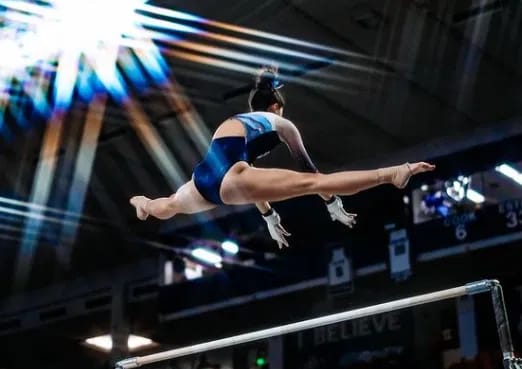

An athlete’s journey is not only dependent on their willpower and determination but also on the influence of their coach. A coach is usually the cornerstone of an athlete’s success, providing guidance, support, and mentorship to help cultivate their potential. However, when a coach abuses that position of power, the repercussions can be devastating, smothering young talent and shredding the confidence of future sports stars.
That issue has come into sharp focus in recent months, amid allegations against a high-profile rhythmic gymnastics coach. These abusive methods have been alleged to be deployed by this person—who is being accused by ex-athletes and parents of doing so. This case raises serious issues about how negative coaching practices can derail the dreams of promising individuals. Let’s dive into the situation and understand what is happening in the Hungarian Gymnastics Association.
Abusing is not a way of teaching a student
ADVERTISEMENT
Article continues below this ad
An anonymous complaint has been lodged in the Swiss-based ethics body of the International Gymnastics Federation against a coach who plays a leading role in both the Hungarian Rhythmic Gymnastics Association (HRGA) and a Budapest club, Free Europe. The coach abuses, squeezes, even pulls, and pushes the underage athletes—sources from the editorial staff of Szabad Europa have claimed. Though the investigation has been started, not much information is available to the public.
As per Szabad Europa, their editorial team tried to contact the organization, but they neither confirmed the complaint nor denied the allegations and said they couldn’t provide information about the individual cases—to protect the data. However, Szabad Europa sources have shown them the letters sent by several complainants to the international federation. Letters to the Swiss ethics committee are also there in which they requested the contact information of the witnesses. What does the president of HRGA have to say about this?

The association is saying that they don’t know anything about this case. President of HRGA, Gyorgy Bencze, replied to the question of investigation, “I am not aware of such a report; the MRGSZ has not received any information about it either officially or through any other channel. To my knowledge, the Hungarian Gymnastics Association (MATSZ) has not received any notification about such a case either.” However, sources said that parents of athletes had personally complained about the coach to the president, and after the report, the club is not even listening to the children.
To this counter question, Bencze replied, “Neither I personally nor the association received any report that I could identify with the contents of your letter. (…) No, I have not heard anything like that, neither officially—in this case, an investigation would obviously have been launched—nor informally did I receive such a signal. Accordingly, no such investigation was conducted during my presidency.” The communication director of the club said, “The association has not received any complaints regarding the activities of the rhythmic gymnastics department coaches.”
According to the sources, the same coach was banned by the Disciplinary Committee of the Hungarian Gymnastics Association in 2010 from international events because of a sports disciplinary offense. The coach used to slap, get athletes into training without dinner, and body-shame students; a student said, “They told me almost every day that I would be fat.” He once threw a full 1.5-liter plastic bottle at an underage student. And there are so many such incidents of abuse, yelling, and pushing by this coach. Now, the question arises: Are all the coaches the same? Should parents not send their children to the organization, especially underage?
ADVERTISEMENT
Article continues below this ad
A coach can help athletes overcome their fears and not fear them
A coach or a teacher is a guiding light, a mentor who shapes an athlete’s future, but when such incidents of abuse and torture come into the picture, a question arises about how to trust them. But not all coaches are the same; there are examples of coaches who treat their athletes or students like their own children.
Gymnastics coach Cecile Landi is an example of how a coach should be. She has a very close relationship with her student, gymnast Simone Biles, and as a mentor, she helped her mature and grow. She even backed Biles’ decision to step down from the 2020 Tokyo Olympics. Because Biles suffered from the twisties (when a gymnast finds it difficult to maintain mental and physical balance), and her coach and other people around her helped her in the best way possible to regain her strength.
ADVERTISEMENT
Article continues below this ad

via Imago
Simone Biles USA, AUGUST 5, 2024 – Gymnastics – Artistic : Women s Apparatus Floor Exercise Final during the Paris 2024 Olympic Games, Olympische Spiele, Olympia, OS at Bercy Arena in Paris, France. PUBLICATIONxNOTxINxJPN 262268753
When Landi became co-head coach at the University of Georgia, Biles congratulated her and said, “I can’t think of a more deserving person.” This shows a good bond between an athlete and a coach. And that’s how it should be, right? The incident at HRGA is so heartbreaking and should not be tolerated at any level. Hopefully, the investigation will be fair and athletes will get justice. Do tell us your thoughts about the case through the comments.
Have something to say?
Let the world know your perspective.
Debate
Should parents trust sports organizations with their children after such shocking abuse allegations?


What’s your perspective on:
Should parents trust sports organizations with their children after such shocking abuse allegations?
Have an interesting take?